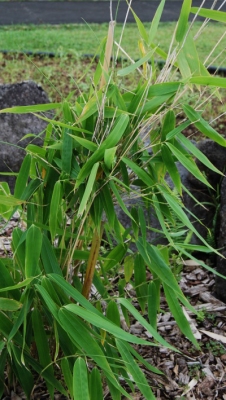Schizostachyum glaucifolium
(Rupr.) Munro
Poaceae
Bambos arundo Sol.
Bambusa glaucifolia Rupr.
Common Name:

Some young Schizostachyum glaucifolium in the gardens at 'Imiloa in Hilo, Hawaii
Photograph by: Indeterminate
Public domain
General Information
Schizostachyum glaucifolium is an evergreen, clump-forming bamboo with woody culms 3 - 15 metres long[
490- Title
- Flora Vitiensis Nova
- Publication
-
- Author
- Smith. A.C.
- Website
- http://www.biodiversitylibrary.org
- Publisher
- Pacific Tropical Botanical Garden; Hawaii
- Year
- 1979
- ISBN
-
- Description
- A comprehensive flora of Fiji, often showing plant uses. It can be downloaded from the Internet.
]. The thin-walled culms can be 35 - 60mm in diameter[
490- Title
- Flora Vitiensis Nova
- Publication
-
- Author
- Smith. A.C.
- Website
- http://www.biodiversitylibrary.org
- Publisher
- Pacific Tropical Botanical Garden; Hawaii
- Year
- 1979
- ISBN
-
- Description
- A comprehensive flora of Fiji, often showing plant uses. It can be downloaded from the Internet.
].
The plant stems have been very important sources of materials in the Pacific, used in a wide range of applications and commonly harvested from the wild for local use. The plant also has a range of traditional medicinal uses. It is, however, widely being replaced in importance in the area by the larger, recently introduced Bambusa vulgaris[
339- Title
- Agroforestry in the Pacific Islands: Systems for Sustainability
- Publication
-
- Author
- W.C. Clarke and R.R. Thaman (Editors)
- Website
- http://www.unu.edu/unupress/unupbooks/80824e/80824E00.htm#Contents
- Publisher
- United Nations University Press, Tokyo
- Year
- 1993
- ISBN
- 92-808-0824-9
- Description
- The guide includes information on 100 species of plants for Agroforestry. It is also available on the web at the address given above.
]. Schizostachyum glaucifolium is an exceptionally beautiful plant that features greenish-yellow culms with darker green stripe, it is often grown as an ornamental in the tropics[
350- Title
- National Tropical Botanical Garden
- Publication
-
- Author
-
- Website
- http://ntbg.org/plants/choose_a_plant.php
- Publisher
-
- Year
- 0
- ISBN
-
- Description
- General information on almost 400 species, with descriptions, habitats and some uses.
].
Known Hazards
None known
Botanical References
490- Title
- Flora Vitiensis Nova
- Publication
-
- Author
- Smith. A.C.
- Website
- http://www.biodiversitylibrary.org
- Publisher
- Pacific Tropical Botanical Garden; Hawaii
- Year
- 1979
- ISBN
-
- Description
- A comprehensive flora of Fiji, often showing plant uses. It can be downloaded from the Internet.
Range
South Pacific - French Polynesia, American Samoa, Fiji.
Habitat
Moderately common along the banks of rivers and streams, in thickets on hillsides, and in comparatively undisturbed forest; at elevations from near sea level to more than 900 metres[
490- Title
- Flora Vitiensis Nova
- Publication
-
- Author
- Smith. A.C.
- Website
- http://www.biodiversitylibrary.org
- Publisher
- Pacific Tropical Botanical Garden; Hawaii
- Year
- 1979
- ISBN
-
- Description
- A comprehensive flora of Fiji, often showing plant uses. It can be downloaded from the Internet.
].
Properties
| Medicinal Rating |      |
| Other Uses Rating |      |
| Habit | Evergreen Bamboo |
| Height | 10.00 m |
| Pollinators | Wind |
| Cultivation Status | Ornamental, Wild |
Cultivation Details
Bamboos have an interesting method of growth. Each plant produces a number of new stems annually - these stems grow to their maximum height in their first year of growth, subsequent growth in the stem being limited to the production of new side branches and leaves. In the case of some mature tropical species the new stem could be as much as 30 metres tall, with daily increases in height of 30cm or more during their peak growth time. This makes them some of the fastest-growing species in the world[
K- Title
- Plants for a Future
- Author
- Ken Fern
- Description
- Notes from observations, tasting etc at Plants For A Future and on field trips.
].
Bamboos in general are usually monocarpic, living for many years before flowering, then flowering and seeding profusely for a period of 1 - 3 years before usually dying.
Edible Uses
None known
Medicinal
The powdered culms are mixed with water and consumed as a treatment for a sharp pain in the stomach and pain associated with profuse sweating[
].
The ashes of the culms, combined with powdered Cyperus javanicus and Diospyros spp., as well as the sap of green kukui fruits (Aleurites moluccana) and ripe papaya (Carica papaya), is applied topically as a treatment for festering raw sores[
].
Other Uses
The long, hollow culms have a wide range of applications, being used for purposes such as construction, house walling, rafters, battens for affixing thatch, shelving and scaffolding, fencing etc; and they are also used to make water containers, fishing poles, knives, and musical instruments such as the nose flute[
339- Title
- Agroforestry in the Pacific Islands: Systems for Sustainability
- Publication
-
- Author
- W.C. Clarke and R.R. Thaman (Editors)
- Website
- http://www.unu.edu/unupress/unupbooks/80824e/80824E00.htm#Contents
- Publisher
- United Nations University Press, Tokyo
- Year
- 1993
- ISBN
- 92-808-0824-9
- Description
- The guide includes information on 100 species of plants for Agroforestry. It is also available on the web at the address given above.
,
350- Title
- National Tropical Botanical Garden
- Publication
-
- Author
-
- Website
- http://ntbg.org/plants/choose_a_plant.php
- Publisher
-
- Year
- 0
- ISBN
-
- Description
- General information on almost 400 species, with descriptions, habitats and some uses.
,
].
Propagation
Seed -
If you have any useful information about this plant, please leave a comment. Comments have to be approved before they are shown here.

 Useful Tropical Plants Database 2014 by
Ken Fern,
web interface by
Ajna Fern
with help from
Richard Morris.
Useful Tropical Plants Database 2014 by
Ken Fern,
web interface by
Ajna Fern
with help from
Richard Morris.